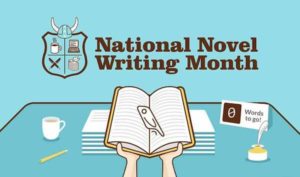 Here it is, November again—National Novel Writing Month. Every year, writers throughout America pledge themselves to produce a 50,000 word novel before the clock strikes December. Thanksgiving can make this good intention the road to a nervous breakdown, but just having a goal of some sort and a nation full of colleagues to hold you to it is bracing. No doubt many people actually do write a complete novel (is 50,000 words really a complete novel?). And that is admirable by any definition.
Here it is, November again—National Novel Writing Month. Every year, writers throughout America pledge themselves to produce a 50,000 word novel before the clock strikes December. Thanksgiving can make this good intention the road to a nervous breakdown, but just having a goal of some sort and a nation full of colleagues to hold you to it is bracing. No doubt many people actually do write a complete novel (is 50,000 words really a complete novel?). And that is admirable by any definition.
But I’ll bet there are also a lot of us who are terrorized by the prospect of being responsible for such an output. It can certainly smack of the forced march. Does anybody check whether those 50,000 words are any good? And once discouragement sets in, it’s only too easy to drop the writing altogether. Excuses are never lacking, especially at this busy season.
From the depths of my mixed experience with ol’ NaNo, let me throw out a few suggestions that will comfort your inner sloth and still keep your nose to the grindstone. Take what is useful to you and throw out the rest.
1. Be reasonable
Only you know your pace of writing and the pressures of your real life. 50,000 words in a month is more than a thousand words a day. Is that within your typical range? If your average is more like 300, think twice before setting a thousand-word goal. Is your production limited by real life duties that can’t be compromised? Don’t expect them to go away for a month, unless you’re fortunate enough to have a cabin in the woods to retreat to. Are you simply a “slow writer,” one to whom inspiration and the proper wording comes at a deliberate pace? Your nature isn’t going to change for thirty days. Don’t feel bullied by the national momentum — set yourself a goal you can reasonably keep.
2. Be understanding
Nothing puts an end to good intentions like discouragement. That’s one of the dangers of the unrealistic goal. If you have set yourself a goal you can keep, you’re on your way to success, and success breeds success. Every day that passes on which you whip out those 300 words, pat yourself on the back. Maybe offer yourself a little reward (my own suggestion is a square of dark chocolate—highly motivating). You may find that 300 sometimes becomes 400 or even more. Look how easy it is! But there will be days when even 300 is impossible, and that’s OK too. Do what you can, but don’t give up. As long as you write, you’re a writer.
3. Call in the troops
The whole principle of NaNoWriMo is that many people together making an effort is more motivating than going it alone. You could argue against that, since writing is an essentially solitary occupation. But unless you’re a strongly self-motivated type, having a support group to cheer you on and celebrate your successes is definitely a plus. If a whole nation full of strangers seems too impersonal and demanding, turn to your local writer’s group—or even report to a friend or family member. At the end of the week, how are you doing on your goal? They can provide that touch of community expectation that may keep you on the straight and narrow without a sense of public shaming.
4. Don’t mistake quantity for quality
To be sure, a first draft doesn’t have to be perfect. But there are better and worse first drafts. Some people polish somewhat as they go, others toss out a rough heap of raw material. This will affect your output. But whatever your style, you have to think about what you’re writing. Reflection is always necessary, at least for most writers. So don’t let yourself become so preoccupied with cranking out X number of words that your quality suffers. Take whatever time you need to produce something that makes sense, that has a kernel of literary quality and the potential to be licked into a winning shape. There are too many irredeemable first drafts already lying at the bottom of drawers! A useful hack for overcoming this is to prepare for November by sketching out your novel in advance, so that all you need to do is start in writing.
I hope these will be useful to at least one colleague out there. Keep writing!

Michael Polelle
In my opinion, the whole idea of NaNoWrImo is an invitation to frustration. If we just bottle the wine and sell it before it’s ready, we won’t need to let it mature. We can mass produce it in shorter time with more time to make and sell (?) more. What happened to Orson Welles saying “no wine before its time.” Likewise, I say “no novel before it’s time.” NaN0IWriMo is like chasing the latest fad diet around January 1 so that we , miraculously, can take off the weight in no time, even though we know at some level it”s an illusion we’ve pursued before . The illusion often leads a predictable cycle of failure and self-reproach when the unrealistic goal isn’t attained. Sure, we writers all need goals ,but let them be goals imposed by us and not by others. Novels, like babies, gestate from within and not from aribitrary deadlines imposed without. I
Niki H Kantzios
Amen, brother! Use Na-no, but be sure the dog is wagging the tail and not the other way around!